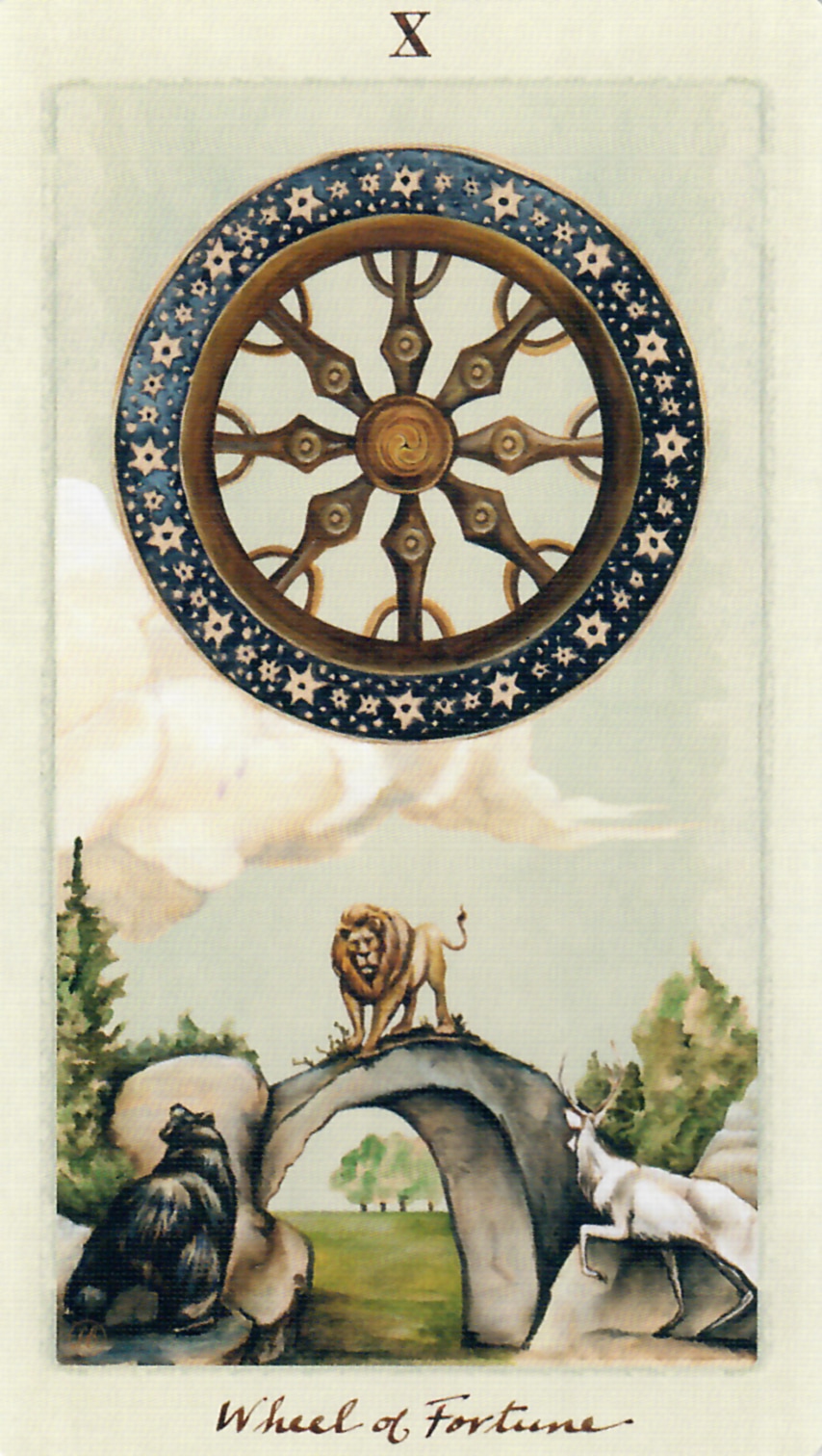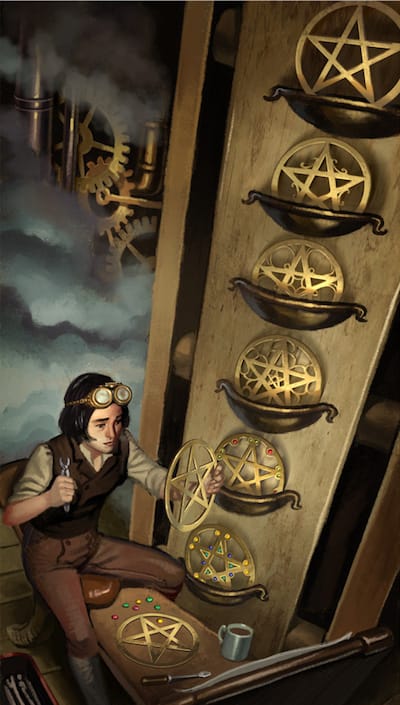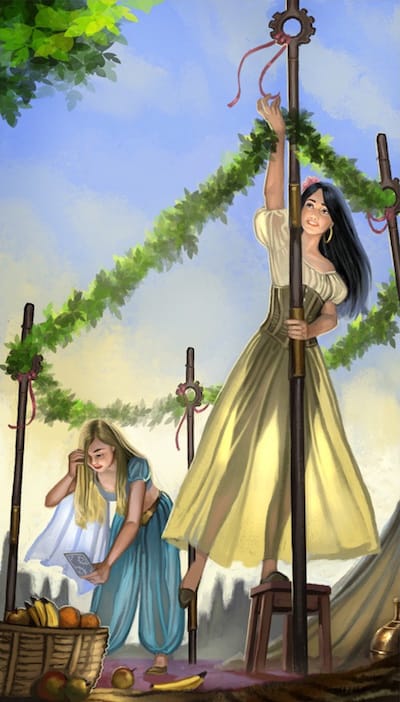I subscribe to none of those. To me, the Wheel of Fortune is a Trickster card, a card of uncertainty. We spin the wheel and takes our chances. Who knows what where the Wheel will stop? Not this tarot reader. I firmly believe that there are some things we are not meant to know and there are cards in the deck that represent this.
Peeking into the future is just one use for tarot. It’s most important function is reading the cards as a sacred text. The Wheel of Fortune is excellent as a sacred text. Here’s the lesson. Things happen. We cannot always control things that happen. I know that is not a popular belief but it is true, isn’t it? The secret golden nugget in the Wheel is: the closer you stand to the center of the wheel, the less likely you are to lose your balance. If we think of our lives as the wheel, the closer we are to our own center, which is defined by our core values, the easier it will be to stay steady, even if the wheel spins fast or lands somewhere that is just plain not cool. Because this year is associated with the Wheel, we can be sure it will be one of change. The 5s are also associated with change and I do think we are going to see the energy of these cards throughout the year. The 5 of Wands will bring a lot of competitiveness and ego. The 5 of Cups will leave us lost in grief instead of actively grieving. The 5 of Swords will bring us Pyrrhic victory after Pyrrhic victory. The 5 of Pentacles is perhaps the most troubling in this case as it shows the potential for a complete separation of our resources from our values (both individual and collective). That what this year is going to teach us. We are going to be tested to see what our priorities and values really are. Unfortunately, our country feels (to me) like it sees its role as a for-profit business, which is why, apparently, so many of us voted to put a businessman at the helm. But I never thought that our country was a business. It is a representation of our values…or it should be. If it is not performing that function, then what do we do? How do we make sure our values are expressed in the world? What are our options? This year is going to be challenging. It will also be a gift. We will finally get to find out exactly who we are. I’ve heard someone say “show me your schedule and budget, I’ll name your values.” I couldn’t agree more and this year is going to be like a final exam. Who have you been striving to become? What is that person going to do in the face of real need…human need, creature need, earth need? May we all hold on tight to our values, not get distracted by the world spinning around us, and stay calm and centered as we help keep the world on course.
This version of the 8 of Pentacles is one of my favorites because it shows the sweat and challenge of hard work. Yes, she has tools and materials, the only way she will improve is to work. Through practice and discipline she learns what she needs to achieve exactly what she wants.
Have you noticed that there are often these words that float to the surface of popular consciousness? Often they are ones we've not used often (or at all) but suddenly, they fall off our lips as if they are part of our understanding of the world. Lately, for me, it's been the word "iteration." Usually I feel annoyance at these words, as if they are some lame affectation. That annoyance is stupid, I know. With this particular word, I've had to fight that irrational reaction because what this word means is so close to what I believe as someone who is always trying to master something new and as a teacher. Iteration is a procedure in which repetition of a sequence of operation yields resutls successively closer to a desired result. Technically, we could use the word "draft," although interation feels more active with more focus on the act of repetition as a learning experience. Repetition is, in so many areas of life, the single best way to get better at something. As many of you know, I'm working to become a better artist. I took classes to get me started but after a point, taking in more information wasn't affecting my actual art. It was only when I started practicing what I'd learned, making mistakes, figuring out what went wrong, and deciding things to try to correct the mistakes did I actually start improving. A lot of art tutorials by established artists feature "cheap supply challenges." The point of these is to show that while quality supplies are awesome, they are not necessary to create good art nor is not having them an excuse not to practice. If you develop skill, you can create with whatever is at hand. The best supplies or tools are no substitute for skill. Skill comes through practice. Saying that we will get better once we take that one class or acquire that specific deck or tool actually undermine your progress and take away your power. So as we all move forward, reaching toward becoming our best selves in whatever areas we are focusing on, the 8 of Pentacles is here to remind us that while we should enjoy and utilize whatever can support us we need to know that practice does indeed make perfect. Make messes, make mistakes, try new things. May you commit to the discipline of your chosen goal. May your successes inspire you. May your mistakes teach you. May you find joy in the process.
If you are not comfortable with reading for public figures, perhaps you would be reading for fictional characters. Some people who don't read for those not present or without permission are okay with ideas like this because these are practice techniques, meant for your learning only.
The idea was born when one of my students did practice readings for public figures. She admitted that when she read for Trump that she had trouble finding anything positive to say because of how she felt about him, because of her judgment of his character and his choices. As readers, we know that not all our clients share our beliefs and are walking differnt paths than ours. When we feel very strongly about their paths, it can be hard to give an objective reading free from our own ideas about what is best. You may wonder if you have such biases. This activity can help throw some light on that question. It does not solve the problem but rather is simply an experiment to explore potential biases, perhaps illuminating a tendency that you might not have been aware of. Step 1: Select 2 "clients" Pick one public figure that you admire, like, or respect. Pick another one, someone who you don't like. Step 2: Decide on the question Develop one question that would be appropriate for both clients. Step 3: Decide on the spread Pick one spread that will address the question and use it for both readings. Step 4: Create the blind testing environment Write each name on small pieces of paper and fold them up so that you don't know which is which. Step 5: Do the first reading Pick one piece of paper, without looking at the name. Do the reading. Make notes or record it. When done, do NOT look at the paper. Step 6: Do the second reading Follow the same instructions as Step 5. Note: unless there was some miracle in shuffling, you will have different cards for each reading. Step 7: Journal or reflect Note how you felt, not knowing who was the client. Did you have moments where you wished you knew who the reading was for, thinking that it would "help" you with the interpretation? Did you consciously think about how you might interpret the reading differently if it was for one client rather than the other? Were there any moments of cognitive dissonance? Step 8: Reveal the names Unfold the papers and learn which reading was for which client. Note your reactions.
As you probably know, I write a lot. Each year I recieve several contracts for publication or for teaching. One day (this was back in 2015), I was telling Lisa about how I love it when my authors (the ones I contract to write for Llewellyn) are so excited to get their contracts and to hear how they celebrate. I said something about how we don't celebrate my contracts because they've become "my job." Then we realized that that is a bunch of crap and that we should celebrate each and every opportunity for the awesome blessing that it is. So now we do because why not?
James Clear notes that despite all the lovely accomplishments, large and small, that he didn't celebrate them. Instead he acted humble and moved on to the next goal. But by doing so, he was not only not honoring the achievement but also depriving his loved ones an opportunity to be part of his life in a really wonderful way. My blessing for you today is that you celebrate your accomplishments, large and small, and that you help those you love celebrate theirs, every day all year long. Love, Barbara January 1. We call it New Year’s but that date has not always (and does not, in all parts of the world) mark the date a year begins. You can read more about the history of January 1 HERE).
Even though December 31/January 1 are just a dates on a calendar, they are infused with so much expectation. It's got to be hard to be an arbitrary point marking an ending and beginning. Even more challenging: on a circle (like the earth’s journey around the sun) there is no one beginning/ending point. Nevertheless, since around 1570, we have invested this date with power. The power of a clean slate. I do adore clean slates; don't you? As Anne Shirley said, "Every day is fresh, with no mistakes in it." A new day is awesome, but there is something even more powerful about a whole new year! The potential! The possibilities! The football games! Fresh calendars, new journals. AND, perhaps most importantly...the new season of Sherlock. Ahem. So whatever energy or magic there is in this time for you, may you soak in it, release and relax into it, let it reveal its secrets to you. I look forward to sharing the journey into 2017 with you. Love, Barbara |
Categories
All
Archives
September 2023
|






 RSS Feed
RSS Feed